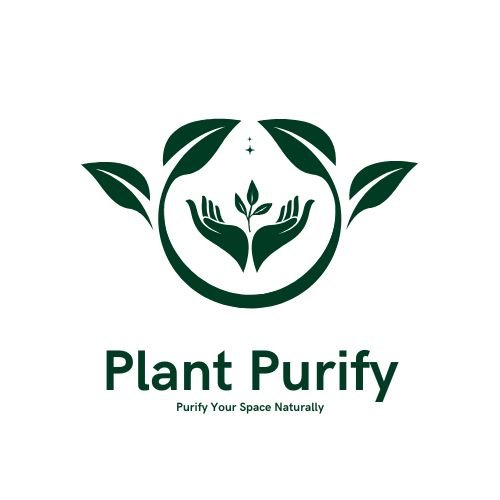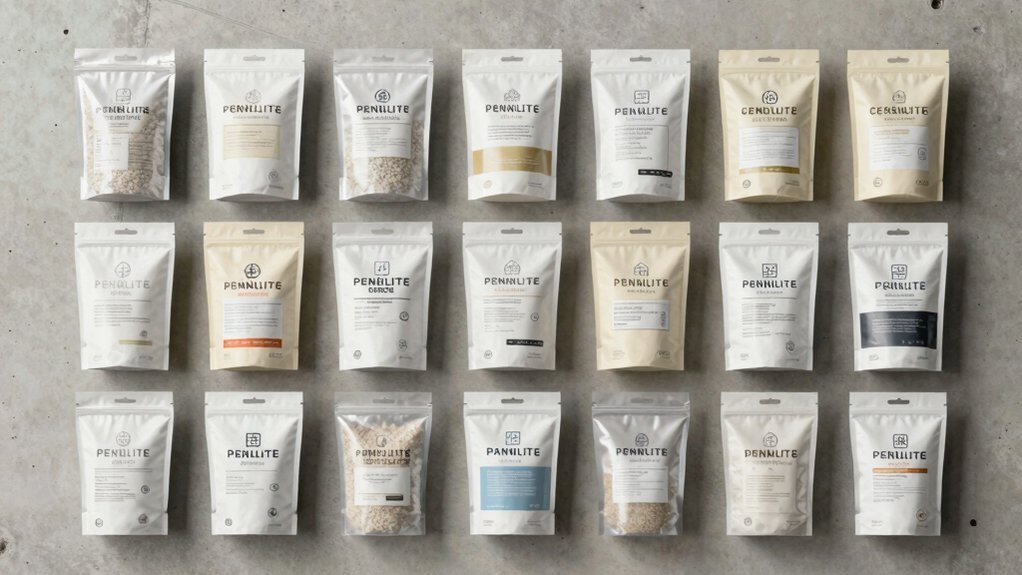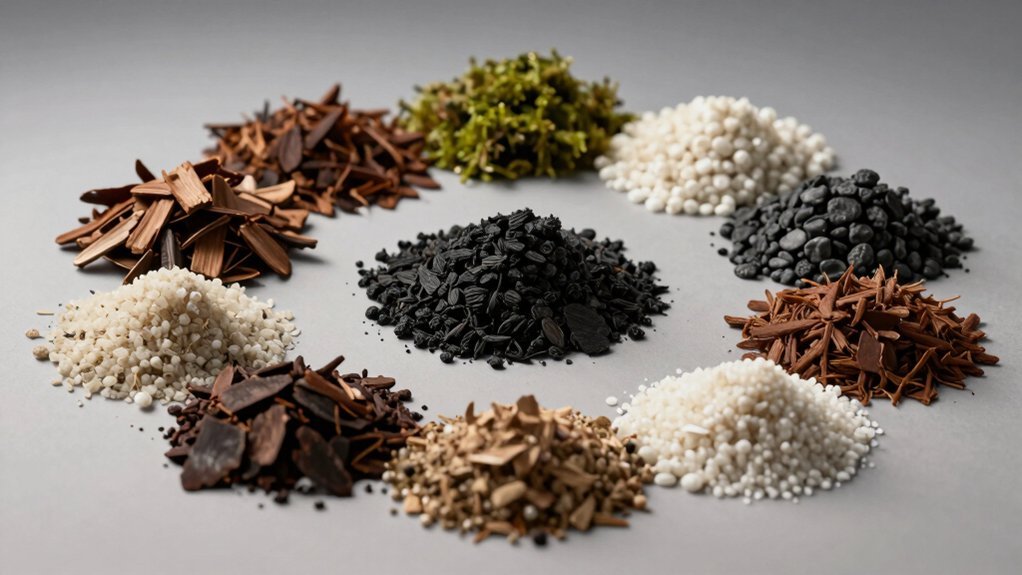Mix premium potting soil with key additives to supercharge your air-purifying plants. You'll want to blend in perlite for aeration, vermiculite for moisture retention, and organic compost at a 1:3 ratio. Add activated charcoal to filter toxins, and incorporate worm castings for rich nutrients and beneficial microbes. Consider aged manure to boost soil fertility and enhance your plants' air-filtering capabilities. These ingredients form just the foundation of creating the perfect growing environment.
Essential Soil Components for Air-Purifying Plants

A successful foundation for air-purifying plants starts with the right soil mix. You'll want to begin with a high-quality potting soil like Foxfarm Ocean Forest, which delivers essential nutrients and superior drainage your plants need to thrive.
To create the perfect growing environment, you'll need key soil amendments that enhance your plant's ability to filter air effectively.
Mix in perlite to improve aeration and prevent waterlogging, while adding vermiculite helps retain just the right amount of moisture.
Don't forget to incorporate organic matter through well-rotted compost and aged manure – these natural additives enrich your soil with nutrients and improve its structure.
Together, these components create an ideal growing medium that supports robust root development and maximizes your plants' air-purifying capabilities.
Organic Matter and Its Role in Air Filtration
You'll find that adding quality compost to your air-purifying plants' soil creates a superior growing environment by improving both nutrient availability and soil structure.
Well-aged manure works alongside compost to enhance your plants' air-filtering capabilities through its slow release of essential nutrients and beneficial microorganisms.
These organic additions create a robust foundation for your plants' root systems, leading to stronger, more effective air purification in your indoor spaces.
Compost Enhances Plant Performance
When it comes to maximizing your air-purifying plants' potential, compost plays an essential role in creating the perfect growing environment. You'll find that adding compost improves soil structure, enhancing both moisture retention and drainage capabilities that your plants need for best growth.
| Benefit | Impact | Result |
|---|---|---|
| Enhanced Microbial Activity | Better Nutrient Uptake | Stronger Plants |
| Improved Soil Aeration | Healthier Root Systems | Enhanced Air Filtration |
| Moisture Balance | Consistent Growth | Increased Toxin Absorption |
| Sustainable Environment | Long-term Plant Health | Better Air Quality |
Your air-purifying plants will thrive with compost-enriched soil, as it creates an ideal environment for root development and toxin absorption. The increased microbial activity helps break down pollutants more effectively, while the improved soil structure supports sustained plant growth and enhanced air-cleaning capabilities.
Manure Benefits Air-Cleaning Properties
Building on the benefits of compost, well-rotted manure offers another powerful boost to your air-purifying plants' effectiveness. When you incorporate aged manure into your potting mix, you'll enhance soil fertility while increasing organic matter, which directly supports plants like peace lilies and spider plants in their air-cleaning mission.
You'll notice that manure's high nitrogen content promotes vigorous growth in your air-purifying plants, making them more efficient at filtering airborne toxins.
The organic matter doesn't just improve soil structure; it creates an ideal environment for robust root development through better aeration and moisture retention.
What's more, manure's organic components help break down toxins in the soil, creating a cycle that maximizes your plants' air-filtering capabilities. This natural amendment truly empowers your indoor plants to perform their air-purifying functions more effectively.
Mineral Amendments for Enhanced Plant Performance

Maintaining ideal soil conditions for air-purifying plants requires strategic use of mineral amendments that can transform your growing medium into an ideal environment.
Strategic mineral amendments are key to creating the perfect soil environment where air-purifying plants can truly thrive.
You'll find that perlite and vermiculite work together to create the perfect balance of soil aeration and moisture retention, preventing root problems while keeping your plants hydrated.
When you're dealing with pH issues, lime and sulfur are your go-to mineral amendments.
If your soil's too acidic, add lime to bring the pH up to the sweet spot between 6.0 and 7.0. For alkaline soil, sulfur will help lower the pH, making nutrients more available to your plants.
Don't forget about aged manure – it's a powerhouse amendment that'll boost your soil's fertility while improving drainage and organic matter content.
Ph Balancing Additives for Optimal Growth
To achieve ideal growth in your air-purifying plants, understanding and managing soil pH becomes essential for their success.
You'll need to maintain pH levels between 6.0-7.0, where most plants thrive and efficiently absorb nutrients.
Start with soil testing to determine your current pH levels. If you discover acidic soil, add lime to neutralize it and boost nutrient availability.
For alkaline soils above 7.0, incorporate sulfur to lower the pH and improve nutrient uptake.
Regular monitoring guarantees your plants maintain prime growing conditions.
Natural Toxin-Absorbing Materials

Beyond pH management, incorporating natural toxin-absorbing materials into your soil creates a powerful foundation for air-purifying plants.
You'll find activated charcoal particularly effective, as it filters out harmful substances before your plants can absorb them.
To maximize your soil's toxin-absorbing capabilities, combine activated charcoal with other powerful soil amendments.
Add perlite to improve aeration and drainage, which helps your plants' root systems develop properly.
Mix in worm castings to break down toxins while providing essential nutrients.
Don't forget to include coco coir, which maintains ideal moisture levels and supports beneficial microbes.
For an extra boost, incorporate aged manure into your soil mix – it'll increase organic matter and enhance microbial activity, leading to better toxin absorption and healthier air-purifying plants.
Moisture-Regulating Soil Enhancers
While air-purifying plants need consistent moisture levels to thrive, incorporating the right moisture-regulating enhancers makes all the difference.
You'll want to combine several soil enhancers to create the perfect growing environment. Add perlite to improve drainage and create essential air pockets that prevent root rot, while vermiculite boosts moisture retention and nutrient availability. For an eco-friendly option, use coco coir instead of peat moss to enhance both water retention and aeration.
To further optimize your soil mix, layer clay pebbles at the bottom of your pots for improved drainage and stability.
Don't forget to incorporate worm castings – they're excellent for moisture retention and will enrich your soil structure, giving your air-purifying plants the strong foundation they need to flourish.
Aeration and Drainage Boosters

When you're looking to improve oxygen flow in your air-purifying plant's soil, perlite serves as an excellent primary amendment by creating essential air pockets throughout the growing medium.
The lightweight volcanic material prevents soil compaction and allows roots to breathe while maintaining proper moisture balance.
To further protect against root rot, consider adding pumice to your potting mix, as its porous structure creates additional pathways for water drainage while maintaining stable aeration levels.
Perlite For Oxygen Flow
Since healthy air-purifying plants depend on well-oxygenated roots, perlite serves as an essential soil additive for ideal growth.
You'll find this lightweight volcanic material effectively prevents soil compaction while creating crucial pathways for oxygen flow throughout your growing medium.
When you mix perlite into your potting soil, you're providing your air-purifying plants with a balanced environment that supports robust root development.
Its unique porous structure works double duty – it retains just enough moisture while ensuring excess water drains away efficiently.
This is particularly beneficial for popular air-purifiers like Peace Lily and Spider Plant, which need consistent moisture without becoming waterlogged.
Pumice Prevents Root Rot
Like its volcanic cousin perlite, pumice offers powerful protection against one of the most common killers of air-purifying plants – root rot. When you add this lightweight volcanic material to your potting mix, you'll create ideal growing conditions that keep your plants thriving.
Pumice's porous structure works double duty by improving both aeration and drainage in your soil. You'll find that its inert nature won't interfere with soil pH or nutrient availability, making it a reliable choice for your air-purifying plants.
Microbial-Supporting Soil Elements
The foundation of thriving air-purifying plants lies in soil elements that support beneficial microorganisms.
To boost soil fertility and enhance your air-purifying plants' performance, you'll want to incorporate microbial-supporting additives that create the perfect environment for beneficial bacteria and fungi.
Key microbial-supporting elements you can add to your soil:
- Compost and worm castings provide essential nutrients while promoting healthy microbial activity
- Well-rotted manure increases organic matter content and helps break down absorbed toxins
- Horticultural charcoal filters harmful bacteria while creating space for beneficial microbes
- Vermiculite and perlite work together to maintain ideal moisture levels and aeration
These additives create a balanced ecosystem where microorganisms can thrive, leading to stronger root systems and more effective air purification in your plants.
Nutrient-Rich Amendments for Vigorous Growth

Your air-purifying plants will thrive with nutrient-rich amendments that naturally enhance soil fertility and promote robust growth.
Compost and aged manure serve as essential fertility boosters, providing the organic matter and nitrogen needed for strong plant development.
Worm castings add another layer of natural nutrition, improving both soil structure and nutrient availability while supporting your plants' long-term health.
Essential Soil Fertility Boosters
Growing healthy air-purifying plants requires more than just basic potting soil, as these specialized plants need nutrient-rich amendments to reach their full potential.
To boost soil fertility, you'll want to incorporate high-quality compost and aged manure, which provide essential nutrients and improve soil structure. Adding perlite helps create favorable growing conditions by enhancing drainage and aeration.
Here's what you'll need for maximum soil fertility:
- Mix compost with your base soil at a 1:3 ratio to improve water retention and nutrient availability
- Add aged manure to increase organic matter and provide slow-release nutrients
- Incorporate worm castings to enhance microbial activity and root health
- Include perlite or vermiculite to prevent soil compaction and promote proper drainage
These amendments work together to create an ideal growing environment for your air-purifying plants.
Natural Growth Enhancing Elements
When seeking ideal growth for air-purifying plants, natural amendments provide crucial building blocks for vigorous development and enhanced air-cleaning capabilities.
You'll find that compost serves as a powerhouse additive, delivering rich nutrients while improving soil structure and drainage capacity.
For best results, mix perlite into your potting medium to create air pockets that prevent root rot and promote healthy root development.
Adding worm castings will supercharge your soil with beneficial microorganisms and natural growth hormones, while simultaneously improving moisture retention.
These elements work together to establish a thriving environment for your air-purifying plants.
Sustainable Soil Mix Combinations
Creating an effective soil mix for air-purifying plants doesn't require complex formulas, but rather a thoughtful combination of sustainable ingredients.
Success with air-purifying plants stems from simple, mindful soil combinations that prioritize sustainability over complicated recipes.
You'll find that combining the right elements enhances your plants' ability to thrive while maintaining eco-friendly growing practices.
Consider these proven soil mix combinations for your air-purifying plants:
- Mix equal parts compost and potting soil, then add 10% perlite for ideal drainage and aeration
- Combine two parts potting soil with one part vermiculite and aged manure for moisture-retaining properties
- Blend three parts standard potting mix with one part horticultural charcoal to filter toxins
- Create a balanced mix using equal portions of compost, perlite, and vermiculite for versatile growing conditions
These combinations provide the perfect foundation for various air-purifying plants while ensuring sustainable growing practices.
Frequently Asked Questions
What Are the Best Additives for Soil Aeration?
You'll get excellent soil aeration by adding perlite, vermiculite, or pumice to your mix. Don't forget coconut coir and horticultural charcoal – they're great options that'll improve air circulation in your soil.
What Plant Removes 78% of Airborne Mold?
You'll want to get a Boston Fern, as it's proven to remove 78% of airborne mold spores from your indoor air. It's most effective when you maintain high humidity and provide indirect light.
What Are the Best Soil Amendments for Indoor Plants?
You'll get the best results by mixing compost, perlite, vermiculite, worm castings, and horticultural charcoal into your indoor plant soil. These additives improve drainage, aeration, nutrition, and moisture retention for healthier plants.
What Is the Best Soil Improver for Plants?
You'll find compost is your best soil improver, as it boosts fertility, enhances drainage, and improves aeration. It's packed with essential nutrients and beneficial microorganisms that'll help your plants thrive naturally.
In Summary
Armed with the right soil additives, you'll maximize your air-purifying plants' potential. Mix organic matter, minerals, and pH balancers to create an ideal growing environment. Don't forget to incorporate materials that boost drainage and support beneficial microbes. Your carefully crafted soil blend will help your plants thrive and efficiently filter indoor air pollutants. Remember, healthy soil equals healthier air in your living space.





Leave a Reply